Redditor Gets Heat For Reporting Neighbor Violating No-Dogs Rule In Community Pool
Living in a dog-friendly apartment complex can be a joy for many pet owners. However, it's time to address the issue when the pleasure turns into frustration due to irresponsible behavior.
This was the case for one resident, OP, who struggled to maintain order in his Arizona apartment complex amidst rising temperatures and increasing tensions. While enjoying the pool, OP encountered a situation that exemplified the growing discord.
Despite clear signage prohibiting dogs in the pool area, a fellow resident allowed his canine companion to swim, disregarding the rules. Despite OP's polite attempt to address the issue, the man remained obstinate, prompting OP to escalate the matter to management.
To OP's dismay, the same scene tested his resolve. Undeterred, he sought assistance from management again, determined to uphold the community guidelines.
With security's intervention, the situation was diffused, albeit with some resistance from the rule-breaking residents. In the aftermath, the resident insulted OP, questioning his motives and empathy.
However, OP remained steadfast in maintaining order and respect for the community rules. Despite the resident's attempts to justify his actions, OP stood his ground, supported by the complex management. Reflecting on the encounter, OP pondered whether his actions were justified.
OP lives in Arizona and is moving out of his dog-friendly apartment because the constant barking and dog waste have made the living conditions intolerable.

OP spotted a man allowing his dog to swim in the pool despite a "no dogs" sign. He alerted him to the rule, but the man disregarded him, so OP informed management.

Community Norms and Conflict Resolution
Community norms play a significant role in shaping individual behaviors and responses. According to Dr. Robert Cialdini, a social psychologist and expert in persuasion, understanding the social dynamics at play can help individuals navigate conflict effectively.
In this case, the decision to report a neighbor for violating community rules reflects a clash between personal beliefs and community expectations, leading to social friction.
The next time OP returned, he avoided the man and reported him to management. Soon after, security removed him.

The man saw OP, remembered him from last week, and insulted him for reporting him.

Research in the Journal of Social Issues demonstrates that individuals often struggle with compliance when community norms are perceived as unfair or unreasonable. This struggle can lead to feelings of isolation or conflict, particularly when one feels compelled to act against the norm.
Understanding these dynamics can aid in developing more effective strategies for resolving conflicts and promoting community cohesion.
Security asked him to leave, but he commented on the situation, expressed frustration, and told OP that he shouldn't live there.

The complex allows dogs, but not in the pool.

Psychological Impact of Rule Enforcement
Enforcing rules within a community can have significant psychological implications for both the enforcer and the transgressor. Dr. Eric Knowles, a psychologist specializing in social behavior, notes that individuals who enforce rules may experience social backlash, especially if their actions are perceived as overly punitive.
Additionally, those who are reported may feel unjustly treated, leading to resentment and further conflict.
It's not appropriate to swim with dogs in public pools.

Dog fur clogs pool filters, and chlorine can harm a dog's coat and skin.

Conflict resolution in community settings often requires empathy and understanding. Research suggests that fostering dialogue among community members can help address grievances and mitigate tension. As Dr. William Doherty, a family therapist, states, "Effective communication is the cornerstone of resolving conflicts and building stronger community ties." This approach emphasizes the importance of listening to differing perspectives and finding common ground to resolve conflicts, a sentiment echoed by Dr. Esther Perel, who notes, "Understanding each other's viewpoints can transform disputes into opportunities for connection."
Saying "shut the fuck up" might have been too harsh, but the main point stands: the complex pool isn't for dogs, so he was in the wrong.

He's wrong for breaking a simple rule in the shared pool.

Fostering Community Engagement
Engagement within communities can significantly improve relationships and reduce conflicts. Dr. Matthew Salganik, a sociologist at Princeton University, has found that when individuals feel a sense of belonging, they are more likely to adhere to community norms and work collaboratively.
Encouraging community events and discussions can build rapport and understanding among residents, creating a foundation for more harmonious living environments.
The complex allows dogs but not in the pool, which makes sense.

It's baffling when entitled dog owners bring their pets to places they're not allowed, like the pool area.

What happened at the pool highlights the crucial importance of following the rules and considering everyone's safety in shared spaces. While having dogs in our complex is fine, there are good reasons why they shouldn't be in the pool.
Dog fur can clog the pool filters, and the chemicals in the water might harm the dogs. Additionally, if dogs urinate or defecate in the pool, it can make people sick. So, it's better for everyone if dogs stay out of the pool.
Some might argue that the response to this situation was too harsh, but the main point remains: the rules exist for a reason. Ignoring them can cause problems for everyone.
If someone really wants to swim with their dog, they should find a lake or beach where it's allowed. In shared spaces like our pool, following the rules is best so everyone can enjoy themselves safely.
OP could have just reported the issue to management without being considered an asshole.
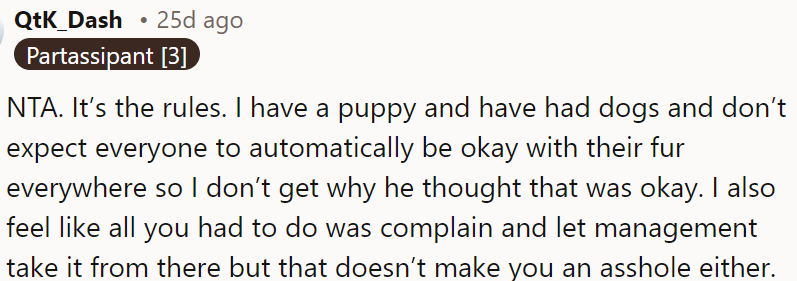
Treating dogs like humans can be unsanitary and pose health risks.
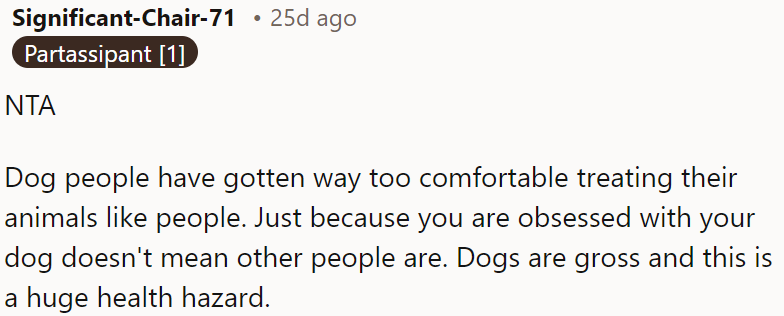
Dogs should stay in dog-friendly places. If the owner wants the dog to swim, they should find a lake or ocean.

People ignore rules and believe their pets are exceptions to the rules.
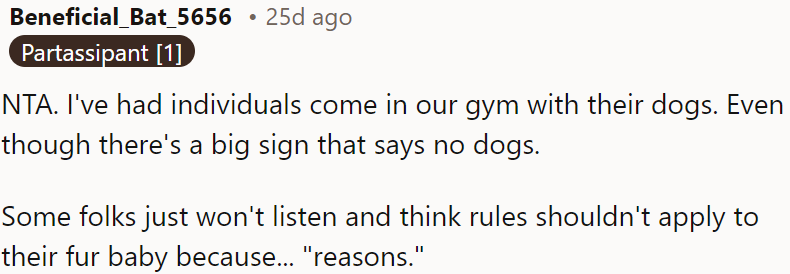
It's unhygienic and harmful for the dog due to the chlorine.

Breaking the pool rules by bringing dogs disrespects the community and management.

Dog hair clogs filters, but the main concern is health and safety due to the risk of contamination from dogs relieving themselves in the pool, potentially causing illness.
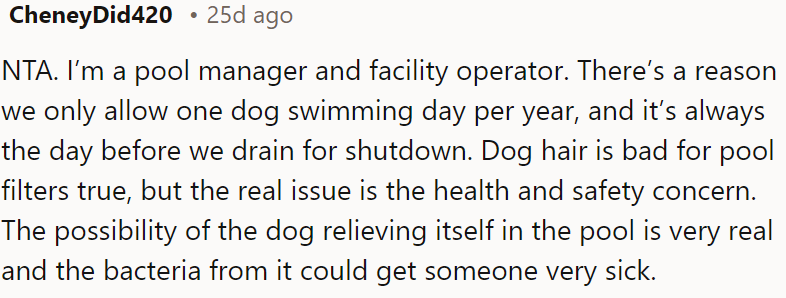
It's essential to keep dogs out of public pools, as much as we love them.
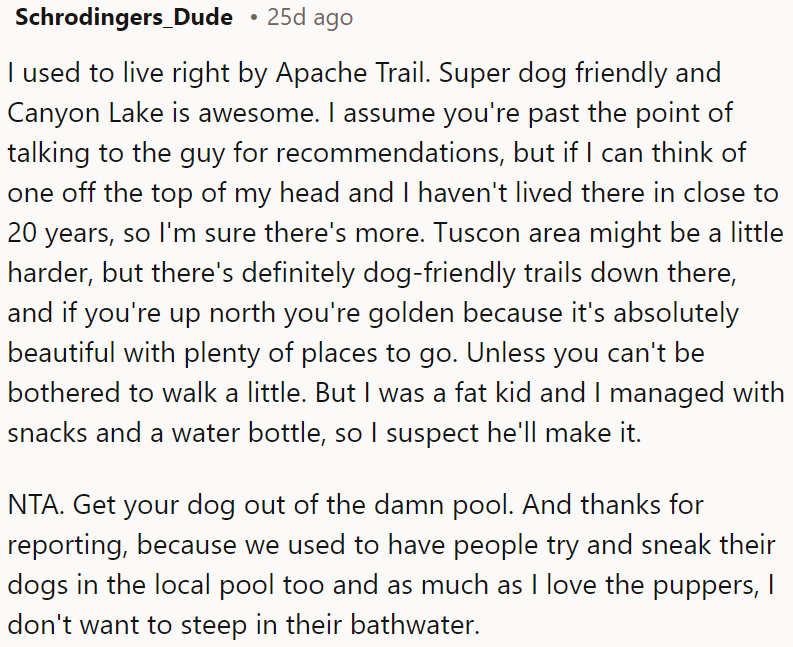
If he disagrees, he should get a home with its own pool, not use one meant for everyone.
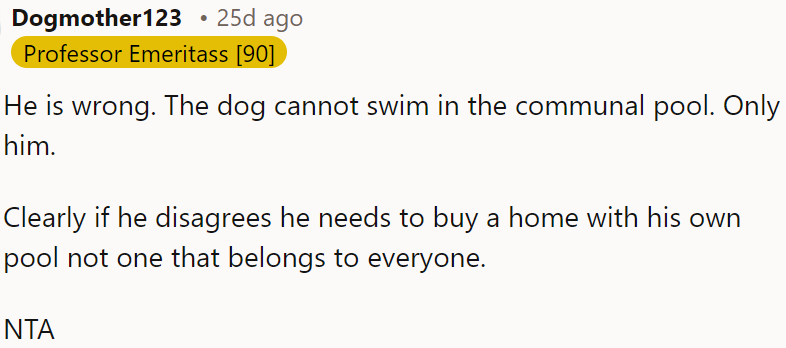
Psychological Analysis
This situation illustrates the complexities of navigating community norms and individual beliefs. The decision to report a neighbor reflects a deep-seated commitment to community standards, but it can also create social tensions.
Encouraging open dialogue and understanding differing perspectives can help resolve conflicts and promote a healthier community environment.
Analysis generated by AI
Analysis & Alternative Approaches
In conclusion, conflicts arising from community norms can be complex and require thoughtful navigation. Understanding the psychological dynamics at play can facilitate more effective resolutions.
By fostering community engagement and open dialogue, residents can build stronger relationships and promote a more cohesive environment.



